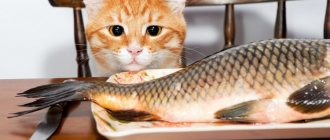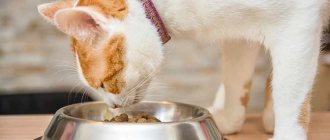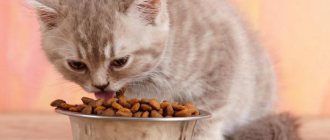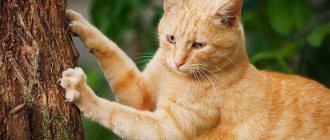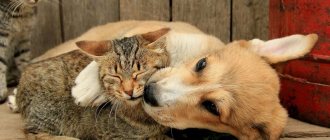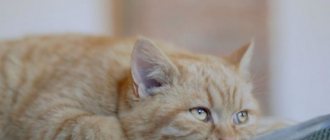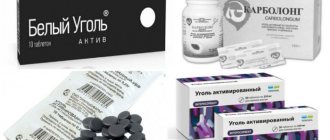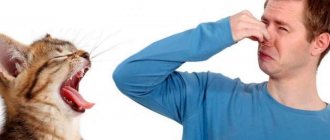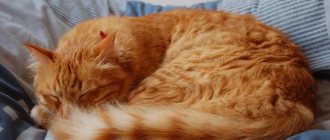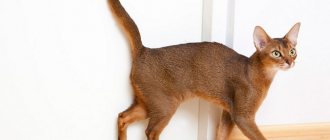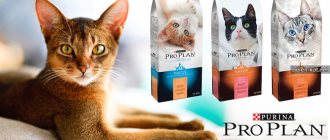Is it possible to feed a cat fish?
When a fluffy kitten appears, a pressing question arises related to its diet - is it possible to feed a cat fish? There are opposing opinions of professional cat lovers and doctors on this matter. The current answer is still ambiguous. To understand all the pros and cons of feeding cats fish, you should recognize the types of fish, their dangerous properties, and benefits for the animal.
Avid cat lovers are sure that fish is healthy for cats. Indeed, certain types of fish are beneficial: they saturate the pet’s body with unique proteins, amino acids, omega-3, omega-6. Substances affect the functioning of the cardiovascular, skeletal, and reproductive systems.
Allowed fish species:
But for the most part, fish can provoke allergies in animals, have a bad effect on the kidneys and urinary system, and contribute to the development of urolithiasis.
Is it possible to feed a sterilized cat fish?
Doctors warn against feeding castrated and sterilized cats raw fish - this leads to urolithiasis and obesity.
Sterilization is a blow to the pet’s body. After the operation, it is necessary to feed the cat with special premium food. Boiled fish should be included in the diet, but not often.
It is forbidden to feed raw river fish to a cat. In addition to the danger of helminth infection and obesity, there is the possibility of disruption of the excretory systems, blood clotting, injury to the larynx and esophagus due to the process of eating meat with bones. May contain heavy metals, antibiotics, hazardous substances.
Sea fish contains a lot of salt and iodine. Feeding her meat can lead to hyperthyroidism - a disease of the thyroid gland, the cause of the disease is excess iodine in the body.
How often can you feed your cat fish?
Professional breeders give three arguments in favor of feeding cats fish regularly:
- Village cats eat fish all the time and live up to 20 years.
- Fish is a source of healthy vitamins.
- They sell packaged fish feed.
There is one important counter-argument to these arguments. Cats, of course, can be given fish (see the list of permitted fish), but it must be boiled, without bones, and no more than once a week. In industrial feeds, fish are pre-treated, most often fishmeal is added to the bags - a flavoring substance reminiscent of fish. The vitamins that predominate in fish are easier to replace with special ones; they will be safe for your pet. Remember, veterinarians do not recommend combining fish and food from a pet store.
If you feed your cat fish for a long time, check it for a number of diseases.
Important signs of an onset of illness with frequent feeding of fish:
- You cannot feel the ribs or spine
- No "waist"
- The belly hangs in folds
- Frequent, prolonged periods of urination
- Reddish urine
- Painful meow
- Excessively licks under the tail
- Increased appetite
- Tachycardia
- Rapid weight loss
The coincidence of a number of signs requires an immediate visit to the doctor to prescribe a diet and treatment.
Pamper your pet wisely. And he will delight you with a healthy, happy look and love!
Harm from fish for cats after castration
Castration is a blow to hormonal levels. The cat’s body feels an imbalance of metabolic processes, which there is nothing to regulate. Appetite remains the same, but metabolism slows down due to castration. For this reason, castrated cats should not overeat. Obesity due to castration develops quickly, which can be recognized by the fat fold on the ribs. The functioning of the liver and pancreas is disrupted. If the cat becomes infected with opisthorchiasis (feline fluke), the animal’s condition will sharply worsen.
Feeding fish to a neutered, overweight cat is dangerous.
Fat tissue retains water, impairing kidney function. Overeating contributes to changes in the acid-base composition of urine. Protein foods make urine more concentrated. The result is urolithiasis. It is not advisable for castrates to consume fish, whole milk products rich in protein and calcium.
Excess salt from eating fish causes water retention in the body, increasing the load on the kidneys. Urination becomes less frequent, and urosalites (oxalates, struvites) begin to crystallize in the bladder and kidneys. This accelerates the manifestation of urolithiasis due to castration.
Thyroid dysfunction with excess iodine also affects metabolic processes, causing an even greater imbalance in the animal’s endocrine system after castration. Excessive appetite is one of the signs of hyperthyroidism. Giving castrated cats fish and seafood, such as hake, cod liver, haddock, and raw river fish, is harmful.
Opinion of breeders and animal owners on the nutrition of sterilized cats
I feed mine regular food, but at the same time I make sure that they don’t gain weight. As soon as extra grams appear, the soldering is cut accordingly.
If only the food provided a guarantee that the cat would not have urolithiasis! Just because it says prevention doesn’t mean at all that ICD won’t catch you. We’ve been suffering with this diagnosis since I was 8 months old. We feed our cat only the best and most expensive food. This is all very individual. Of course, the food should be good from the start.
We also did not switch the castrates to special food. In any case, I don’t want to constantly stuff myself with this food. There are normal foods with urolithiasis prevention. If you have problems, you can, at worst, take a course of special nutrition.
I have a British neuter who is almost 11 months old, we were neutered at 8.5 months and started thinking about whether to change the food. Before this we ate Kitten Hills. As a result, after reading a lot of information and consulting with experienced cat owners, I decided to supplement the previous feeding for a couple of months, and then switch to good adult food. A few days ago we switched to Felide and so far we are incredibly happy. The restructuring of the body after castration lasts a couple of months, so it’s not scary to feed kittens, and the cat itself is still a kitten up to a year old. And then you can switch to adult food, not necessarily for castrates, if your cat is healthy and does not have excess fat.
Personally, I do not believe that a healthy neuter needs any special nutrition. Therefore, all my castrated animals (a cat and 3 males) eat “regular” food, everything is OK.
It is not difficult to choose food for spayed and neutered animals: in most cases, they eat the same as their absolutely healthy counterparts. Ideally, these should be holistic foods that contain a lot of meat and enough nutrients
However, if there are any deviations, it is important to promptly contact a veterinarian and monitor the pet’s condition. Any error in nutrition poses a greater danger for neutered pets than for other animals.
Ekaterina Gonina
What fish should you not give to cats?
Due to the many possible negative consequences, you should not completely exclude fish from your cat’s diet. You just need to take into account that cats cannot be fed the following fish:
:
- Raw
- Salty
- Stale
- With bones
- Fish heads
- Canned
- Hot or frozen
- Fried
Also, you should not feed obese animals or old cats fatty fish, such as mackerel or sardines. It is unacceptable for a cat to eat fish from polluted waters. In this case, harmful substances such as pesticides, heavy metals, and mercury can accumulate in its meat.
If you follow all the rules regarding the quality and quantity of fish that should be in your cat’s diet, then this product will not cause any health problems. You just have to remember that fish should not be given often. It is necessary for the cat to consume it boiled and without bones. With this approach to feeding your pet, the question of whether fish is harmful to cats will not arise. It is worth remembering that cats should not be given fish in excess, and provide the pet’s diet with healthy foods in sufficient quantities, then everything will be fine with his health and mood.
Many pet owners are perplexed why cats should not be given fish, because they eat it with great pleasure. However, there are reasons for this. In today's article we'll talk about why cats shouldn't eat fish.
It is common knowledge that fish products contain magnesium and phosphorus. These substances are beneficial for brain function, but in addition to the positive properties, a negative effect is added - they contribute to the formation of stones in the urinary tract. In addition, river and sea inhabitants contain a lot of histamine, which provokes allergic and inflammatory processes.
If cats often consume fish products, the body will lack vitamin K, which is responsible for normal blood clotting. In addition, with frequent consumption of fish, the pet becomes addicted, and the cat will refuse any other food. Among the negative aspects of eating fish, it is worth noting thyroid disease.
To all these arguments, we can add one more unpleasant moment: after eating fish products, cat feces emit an unpleasant odor.
Sometimes the question of why cats shouldn't be given fish is controversial. Some argue that cats have always eaten fish, and this was their main food. But if we remember zoology, then individuals from the cat family did not feed on fish under natural conditions. They are not very fond of water and do not engage in fishing, with the exception of jungle cats.
River species are strictly prohibited for feeding in any form. They are dangerous not only because of worms, but also because they contain a large number of small bones and can lead to damage to the pharynx. You should also avoid eating pollock and mackerel.
You should not give fried and salted fish, as well as canned fish. Heads are also not given to domestic cats. And of course, if you introduce small portions of fish into your diet, it must be fresh. If the fish is smelly and should not be consumed by humans, then this is not a reason to feed it to a cat.
Benefits and harms
Uncontrolled feeding of fresh food to cats can be harmful to health:
- Large bones are dangerous. They dig into the soft tissues of the mouth, throat and esophagus and can cause pain, vomiting and inflammation.
- Gluttony causes stomach fullness and vomiting.
- Thiaminase fish, mainly freshwater fish from the carp family, destroys vitamin B1, impairs appetite and has a negative effect on the skin and coat.
- Trimethyloxide varieties cause anemia and a decrease in the intensity of coat color.
- An increased concentration of proteins increases the load on the liver and kidneys and causes their disease. Therefore, you should not pamper your pets with fish every day.
Be sure to read:
Cat nutrition after sterilization: what food to feed, what to exclude from the diet
The harm of fish meat as a component of the diet has been exaggerated. If you use the product as a treat, there will be no negative effect on the cat’s body. And quarterly deworming will prevent helminthic infestation.
READ Nymphea (water lily) planting and care in a pond or aquarium
Healthy foods
Half of the diet is made up of proteins, the rest is made up of carbohydrates with fiber and fats.
It includes the following “dishes”:
Poultry, rabbit, beef. This is the basis of nutrition, it is given daily in boiled form, raw food is pre-frozen for 5 - 6 days. Before feeding, cut into pieces. Minced meat is allowed if you prepare it yourself; store-bought stuffing is too fatty. Fresh meat is not fed to avoid infection with helminths.
By-products: lung, kidneys, liver. They contain nutrients that are not found in muscle fibers; they are also frozen or boiled and included in the diet 2 times a week.
Meat broths. It is useful to accustom sterilized pets to this dish: they need an increased amount of liquid, but they are reluctant to drink water.
Vegetables: zucchini, carrots, pumpkin, cabbage. The boiled product is crushed into puree, the raw product is grated. If the pet refuses vegetables in their pure form, they are mixed with chopped meat or broth.
Fermented milk products up to 10% fat. Ryazhenka, sour cream, kefir, yogurt without fillers, and cheese are suitable.
Porridge: rice, barley, wheat, buckwheat. A teaspoon is added to meat or offal. If the animal refuses, then it is replaced with bran.
Vegetable oil, butter. Add 2-5 drops to food to maintain normal coat condition and improve stomach function.
It is useful to sprout greens from wheat grains, oats, or buy ready-made grass at a pet store. Vitamin and mineral supplements are given only on the recommendation of a veterinarian.
What kind of fish is best to give to cats?
Let’s make a reservation right away - you should choose fish not for reasons of cheapness, but based on what kind of fish will benefit the cat.
Cats should not be given:
- Freshwater fish varieties (carp, roach, bream, crucian carp).
Cannot be fed raw due to the high content of antivitamins and deworming. And even when boiled, it is impossible to get rid of many small bones that are dangerous for your pet. The meat is too lean, there is not enough of it, and the labor costs for such food are not worth it - it is easier to give a piece of chicken.
Small fish caught with a fishing rod are not the best treat
- Sea fish that accumulate histamine and mercury (tuna, mackerel, herring).
The most useful varieties include fish from the salmon family:
- river trout (lives only in clean water, quite fatty, rarely infected with parasites);
- salmon, pink salmon, chum salmon.
If you need a diet with a low amount of fat, then you can give boiled lean fish - hake, cod, blue whiting.
Trout is a good choice
Why is fish bad for cats?
- A blow to the kidneys. The salts found in fish “sit down” this important organ.
- Provocation of urolithiasis. Phosphorus and magnesium contained in fish are building materials for struvite urinary stones.
- Source of helminthic infestation. Particularly unpleasant is opisthorchiasis - a long-term, constantly worsening helminthiasis that affects the liver, gall bladder and pancreas. Its source is carp fish.
- Hypovitaminosis. The enzyme thiaminase, present in some types of fish, destroys vitamin B1 (thiamine), trimethylamine oxide binds iron, making it indigestible, the result is anemia. Long-term consumption of fish also depletes vitamin E resources.
- Vitamin K is necessary for proper blood clotting. Cats can synthesize their own vitamin K from most foods, but a fish-based diet does not support the synthesis of this vitamin in sufficient quantities.
- Seafood in general is a rich source of iodine, but cats cannot absorb much of it. There is a connection between a cat's consumption of iodine-rich food and the development of hyperthyroidism (increased thyroid function).
- Presence of bones. Fish bones are one of the causes of injury to the larynx, esophagus, and intestines of a cat(!)
- Development of allergies. Fish, or rather its protein, is one of the most allergenic foods for cats. And allergies are serious!
- Ecology. Fish is far from a safe product. It is no secret that modern reservoirs contain elements of the periodic table that are unusual for them, which “settle” in the body of their inhabitants. Fish, especially predatory species, may contain elevated levels of heavy metals (including mercury), pesticides and other toxins. This fish is not good for people either, but cats are at even greater risk! In addition, now some types of fish (in particular salmon, trout) are grown in special incubators, where they use chemical additives, antibiotics, etc.
- Aesthetic moment. The fact that a cat eats fish can be unmistakably determined by the smell from its tray (the laurels of primacy here go to pollock)
Feeding sterilized cats with industrial food
Feeding your cat only industrial dry food increases the risk of urolithiasis.
Cheap food is of poor quality and contains large amounts of heavy minerals and salts that contribute to the development of kidney and liver diseases.
When eating such food, the pet’s body weakens and does not have time to cleanse itself in a timely manner; salts are deposited in the bladder and kidneys, forming stones. Therefore, cheap Kitekat, Whiskas, Friskies, Happy Cat should be excluded.
You need to purchase premium or super-premium food. The rate of protein absorption should be more than 80%, and the amount of salts should be minimal.
Usually this food is marked “For sterilized cats.” It contains fewer calories, fat and moderate amounts of phosphorus, calcium and magnesium. Enriched with microelements and immunostimulants.
Popular manufacturers:
- ProPlan. They produce dry food, canned food and spiders. They are made from fish, beef, and poultry.
- Royal Canin. In addition to dry food, they produce pates, jellies, and sauces. There are rulers for different genders and ages.
- Hill's. Made from chicken meat. Contains no more than 9% fat and L-carnitine.
- 1st Choice. Made from chicken meat. Does not contain corn or wheat. Contains oats, barley, brown rice.
Expensive foods may not be labeled “For sterilized cats,” but they are suitable for feeding after surgery.
your task is to choose the right diet for the animal (less fat and calories, more minerals)
Holistics contain an increased amount (from 40 to 75%) of protein. These are Now Natural, Go!, Orijen, Acana.
The quality of the feed is indicated by the following characteristics:
- ingredients are listed in descending order, meat comes first;
- the food does not contain flavoring additives or dyes;
- contains L-carnitine, which speeds up metabolism and burns fat;
- contains L-lysine, which supports muscle mass.
Canned food wins over dry food. They contain a dosed amount of moisture that does not require additional fluid intake. Canned food and dry food should be alternated, using products of the same brand.
When choosing food, you should take into account the innate characteristics of the animal. For example, the British cat and the Scottish Fold have poorly developed joints. Therefore, food for them should contain an increased amount of minerals.
Why cats should be given fish: arguments from owners
Why not? After all, he/she needs it - for health, for shiny fur, in the end, because it has always been like this - from time immemorial! This is the thinking of most owners who succumb to the complaints of their four-legged friends and pamper them with “delicious food”. For them, the benefits of this product are indisputable - after all, it contains Omega-3 and Omega-6 - fatty acids that have an extremely beneficial effect on the body - they prevent the development of many diseases, make the coat glossy and thick, and have an anti-inflammatory effect.
Here are a few more arguments from owners who prefer “natural” to “drying” - river, sea, raw and boiled, smoked and salted:
Cats have always eaten fish.
This argument can be heard in all disputes devoted to the proper nutrition of our little brothers. They say that for many millennia such fearless hunters took their inhabitants from ponds, rivers and lakes, and then ate them. This proves the attachment of four-legged pets to pike, perch, capelin, whiting. However, in declaring this, we forget that it was man who got the cat addicted to fish. The distant ancestors of our pets were their African wild counterparts. They were even afraid to approach the water, let alone put their paws in it. But they hunted rodents and larger animals with great pleasure. It turns out that a mouse is a more natural food for a domestic cat than the same fish.
In the villages, all the cats ate fish and did not complain.
Of course, they only lived much less than the city dwellers. Often it was the diet, which included everything that fell from the owner, that became and continues to become the cause of illness and death of village animals. Do you want your cat to suffer the same fate?
I had a friend whose Fluff/Barsik/Vaska ate fish all the time and lived a long time.
What significance can an example with some Barsik or Vaska have if the body of each pet is individual? Some people have excellent health, while others experience allergy attacks every time the owner feeds them perch or burbot freshly caught from the river. Do not transfer other people's experiences to your pets. Remember: what is a delicacy for one can become real poison for another.
What about healthy fish oil?
It can be completely replaced by including special additives in the cat’s diet, which we will discuss at the end of the article.
As you can see, all the myths have been destroyed, and the question of whether it is possible to feed a cat raw and boiled fish every day should no longer arise for a caring owner. However, one explanation is not enough; irrefutable evidence of harm is also necessary. After all, if in front of the owner the animal does not feel sick from what he eats, he is unlikely to take a completely different position after hearing arguments against it.
Why should neutered cats not eat fish?
Most veterinarians, after castration surgery, warn animal owners that from now on fish should be completely excluded from their pets’ diet, because its consumption has an extremely detrimental effect on the cat’s health. This is explained primarily by the fact that the fish menu is not healthy for all cats without exception, because in the wild this diet is natural only for some species of felines. The rest hunt mainly for small animals and birds, and in general they don’t like to go into water.
In the wild, only a few cats eat fish.
After surgery, during which the reproductive organs are removed, the hormonal levels change dramatically. Metabolic processes slow down and there are not enough necessary hormones for their normal regulation. Due to overeating (castrati usually have an excellent appetite), adipose tissue is deposited, which retains water. The functioning of some internal organs (pancreas, liver) is also impaired. Infection at this moment with helminths contained in raw fish (river and lake) will be especially severe.
Protein foods make urine richer and more concentrated. The cat’s body copes much worse with removing excess magnesium, potassium and phosphorus salts contained in fish (especially sea fish) in increased quantities. The result is the deposition of phosphates and oxalates (sand and stones) in the urinary tract and, as a consequence, the development of urolithiasis. To top it all off, there is an even greater imbalance of the endocrine system due to disruption of the thyroid gland, caused by excess iodine in the body.
In sterilized animals, sexual function is preserved, but the level of hormones still changes; consumption of fish is also undesirable for them.
What else can neutered cats not do?
The following products must be excluded from the diet of castrated animals:
- fatty meat (pork);
- raw poultry meat (chicken);
- fermented milk products with high fat content (cottage cheese, cheese, sour cream, etc.) and whole milk;
- liver;
- smoked, as well as salty and spicy.
Cats should not eat smoked food
Once upon a time, we had a Siamese cat who was fed exclusively with boiled pollock. She didn’t admit anything else. She lived for more than 15 years and did not suffer from any illnesses.
What changes after castration?
After castration, cats may experience a narrowing of the urethra (especially if the animal underwent surgery earlier than a year), therefore, if stones begin to form in the urinary tract and kidneys, they are simply not excreted. Stones are deposited on the walls, provoke inflammatory processes and cause a lot of discomfort to the animal. Before castration, the animal’s body copes better with excess salts of phosphorus, calcium and magnesium, but then they begin to accumulate in the form of phosphates and are deposited in the urinary canal.
Also, castration often leads to a decrease in physical activity: the sex drive in cats decreases and is replaced by the desire to sleep and accumulate excess fat. That is why the owner’s task is to choose a balanced diet and not to overfeed the pet, even if he has “sad eyes” and hangs around the bowls like a snake.
The need for fish for cats
Can cats fish and is it necessary to include this delicacy in your pet’s diet? Veterinary experts believe that the menu for four-legged friends can include boiled marine fish. Before cooking the product, you need to separate all the bones to avoid injury to the animal’s larynx and esophagus.
Can a neutered cat eat fish?
Why can't cats fish? It is believed that after castration the risk of developing bladder stones increases. Poor nutrition can contribute to the development of a dangerous pathology. However, some veterinary experts believe that it is still possible to occasionally give fish delicacies in small quantities to pets who have undergone the castration procedure.
Note! The presence of fish in the diet of animals does not in any way affect the risk of urolithiasis, despite the fact that the product contains a large percentage of phosphorus, which creates conditions for the formation of struvite in the bladder area
Fish for a sterilized cat
Why can't cats be fed fish? Cats that have been neutered should not eat this product frequently. Scaly ones can only be in a pet’s diet as a rare treat. Although, if possible, it is better to avoid such a product.
Important! Under no circumstances should you give raw products, as this risks, at a minimum, infection with helminthiasis. If you want to give your cat a fish, you should give preference to marine varieties that will do more good than harm.
All dice must be pre-selected.
Is it possible to give canned food?
Super-premium canned food, which is prepared for fluffy purrs, does not contain harmful substances. Among the main ingredients of the products, there are a large number of natural elements, minerals and vitamins that can help restore the health of the animal and compensate for their deficiency in the body.
However, when choosing canned food, you should pay attention to quality. Of course, not every owner has the opportunity to purchase ready-made holistic food, but a super-premium diet is available to the majority of consumers
Important! Fish, like milk, should rarely be present in the diet of animals
What kind of fish to give: raw or boiled
It is important to pay attention not only to the type of fish, but also to the method of its preparation. It is unacceptable to give your pets whole fish raw. It is worth considering that not every part is digested by the body of a four-legged friend in the same way.
In addition, raw fish can cause the development of helminthiasis. Cat owners who introduce raw food into their cat's daily diet can cause a deficiency of vitamin B1 in the body. If a cat eats raw fish systematically, his health will undoubtedly worsen.
It is worth considering that not every part is digested by the four-legged friend’s body in the same way. In addition, raw fish can cause the development of helminthiasis. Cat owners who introduce raw food into their cat's daily diet can cause a deficiency of vitamin B1 in the body. If a cat eats raw fish systematically, its health will undoubtedly worsen.
How to properly feed a neutered cat
You cannot feed a castrated cat any food! This is the first rule that the owner must remember. For the well-being of your pet, the following principles should be followed:
- reduce as much as possible the consumption of foods containing calcium (milk, hard cheese, soy), magnesium (buckwheat, fish) and phosphorus (fish, seafood);
- Make sure your cat drinks enough fluid (the ratio of water to food should be 3:1);
- alternate wet and dry types of food if the animal prefers ready-made food (for example, offer canned food in the morning and evening, and give granules for lunch in your absence and at night);
- If you are gaining weight rapidly, reduce not the frequency of feedings, but the size of the serving. The daily intake of industrial food depends on weight and averages 40-70 grams for small individuals and 70-100 grams for more well-fed pets. The volume is divided into 3-4 times (for young cats) and 1-2 doses for adults;
- enrich your diet with vitamin complexes (especially important with a natural diet);
- control urine pH by taking tests every six months;
- don't overfeed. Although an abundance of food will please your pet, it will lead to the appearance of various diseases.
Let's consider what you need to feed a cat after castration surgery to prevent obesity and urolithiasis.
Ready-made feed
Factory-produced food is an ideal option that greatly simplifies the life of owners of neutered cats. The back of the package always indicates the recommended portion of food depending on the weight and gender of the animal. You need to focus specifically on this figure and not spoil your pet by giving it a “stomach festival.”
Veterinarians recommend choosing specialized food of good quality from the “premium”, “super-premium” or “holistic” segments with a special icon - “Sterilized Cat”. This food has a reduced content of fats and carbohydrates, but an increased concentration of proteins. They also contain substances that artificially reduce the acidity of urine and prevent the formation of stones.
Well-known brands have developed special lines for neutered cats, taking into account the nutritional characteristics of such animals:
- in the premium segment these are Pro Plan, Hills Feline, Royal Canin;
- among the “super-premium” level feeds there are 1st Choice, Eukanuba, Bosch Sanabelle;
- from the “holistic” category - Grandorf, Farmina, Pronature Holistic, Acana.
Budget brands (Whiskas, Kitikat and others) are popular precisely because of their low cost. However, the food of these brands contains not very high-quality ingredients. Their frequent consumption has a negative impact on the health of pets. However, when purchasing any food, even high-end food, you should not hope that your cat will like the food right away. A suitable option must be sought experimentally, offering the animal various brands.
Remember that the menu of a neutered cat should include not only dry food, but also canned food in a ratio of 70:30. It is better to choose products from one brand, since the composition even among brands of the same segment varies significantly.
Dry granules are stored for a long time and have an optimal ratio of proteins, fats, carbohydrates, vitamins and minerals. Solid food is necessary to prevent problems with teeth and gums. But with this type of diet, cats drink more liquid, so you need to constantly monitor the fullness of the water bowl.
The animal’s diet should also include wet food, which:
- sold in portioned bags designed for 1-2 times, so the risk of overeating is minimal;
- contains a lot of moisture to maintain the body's water balance and prevent diseases of the urinary system;
- presented in a wide range of different tastes and textures (sauces, jellies, soups).
Ready-made food is well balanced and provides the animal with all the nutrients necessary for good health. But you should not overfeed your pet, for which it is recommended to measure portions using a special cup (there is a scale on it). After the age of 7, the daily ration is reduced by approximately 200-300 grams to prevent obesity and problems with the cardiovascular system.
Natural food
If you feed a castrated cat regular food, then you need to take care of the correct diet, which is based on:
- meat and poultry that provide protein and B vitamins. Choose low-fat types - chicken, rabbit, beef, turkey;
- meat by-products cannot completely replace meat, but are necessary to expand the menu. These are chicken (or turkey) liver and ventricles, beef tongue, lungs and heart;
- oatmeal, rice, buckwheat and millet porridge;
- seasonal vegetables (make up 10-15% of the daily diet). You can offer cats carrots, beets, zucchini, pumpkin, cauliflower, broccoli, greens and spinach. Potatoes contain a lot of starch, so it is better to exclude them from the menu;
- fermented milk products with a low percentage of fat (cottage cheese, acidophilus, kefir, fermented baked milk and yogurt);
- chicken and/or quail eggs. The former are boiled, and the latter are offered raw 1-2 times a week.
Unprocessed fresh meat or offal is not recommended. First, the tenderloin or fillet is cut into portions, boiled in unsalted water, finely chopped and mixed with the finished porridge. Vegetables are grated, greens are chopped, and then mixed with porridge or meat. Sprouted grains (oats, wheat, barley) are given to cats to maintain stomach function.
Young castrates are fed 3-4 times a day, adults – 1-2 times. The daily requirement is 30-40 grams per 1 kg of weight. The resulting figure is divided by the recommended number of meals. Even if the cat is begging for food, looking at you with sad eyes, do not give in to manipulation. It is better for the animal's health if it remains a little hungry.
Don't give food from your table! In addition, the following foods should not be present in the diet:
- fatty pork;
- fish (especially sea fish);
- ready-made canned food;
- milk;
- flour products;
- semi-finished and smoked products;
- legumes and pasta.
Fatty fish (sea fish) contains a huge amount of phosphorus, so it should be completely excluded from the animal’s daily menu! Smoked or salted foods increase the risk of developing urolithiasis in an operated cat.
